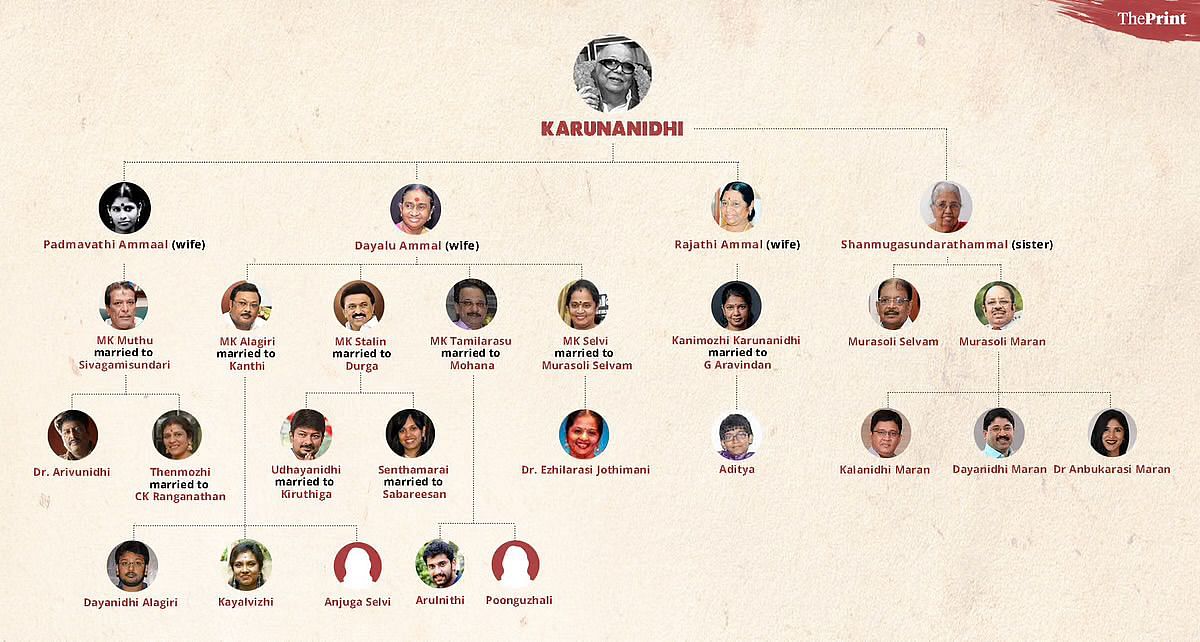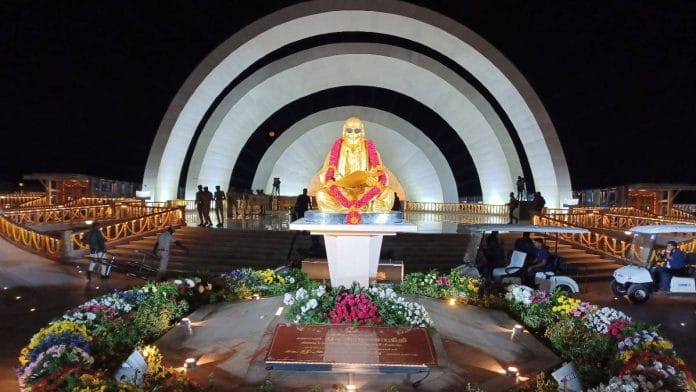Chennai: A galaxy of politicians and cine celebrities were walking into the wedding reception of former Tamil Nadu chief minister M. Karunanidhi’s grandson Arulnithi in Chennai on 8 June, 2015. Then aged 91, the Dravidian patriarch and Dravida Munnetra Kazhagam (DMK) chief, fondly called Kalaignar (artist), was seen sitting in his wheelchair and holding the mic.
“Self-respect marriages should continue to happen in the state. Those who are seated here should strive to make those families that accept such marriages prosper,” he said at the event held at Kalaignar Arangam banquet hall in the premises of the DMK headquarters.
Arulnithi, the son of Karunanidhi’s youngest son M.K.Tamilarasu, had got married to Keerthana, daughter of retired Madras High Court judge Kannadasan, that year. The marriage was solemnised as an inter-caste self-respect marriage (one which is not performed by a Brahmin priest and does not involve the wearing of a mangalsutra and other customs. The couple exchange garlands and take oath as partners).
Born in the Isai Vellalar caste, Karunanidhi, who died in 2018, came from the most backward community of musicians and dancers who perform at temple festivals and social gatherings. His family tree shows that the majority of marriages were inter-caste and almost all were self-respect marriages.
A long-standing leader of the Dravidian or self-respect movement — which calls for dismantling of Brahminical authority, eradication of the caste system, social reform and equality for women — Karunanidhi made his son M.K. Alagiri marry Kanthi, from the Dalit caste, marking his commitment to inter-caste marriages and caste equality.
“Kalaignar’s great-grandchildren are getting married now, and they too seem to be going for inter-caste self-respect weddings. It is his legacy and he lived up to his principles even in his personal life,” says political commentator Raveendran Duraisamy.
Entering the Self Respect Association at the age of 14, Karunanidhi was stubborn in his principles as early as 1944.
He was reported to have even given up his ladylove as her family was not ready for a self-respect marriage in 1944.
“They said they cannot allow a self-respect style of marriage and said they cannot give their daughter in marriage if the wedding was not solemnised under orthodox customs,” he recalled at one of the self-respect marriages in 2013, adding that he decided to not accept their terms.
Later, he wed Padmavathi Ammal in the same year in a self-respect marriage.
“Though Padmavathi Ammal was from the same caste, the marriage was a self-respect marriage. But, his marriage with (third wife) Rajathi Ammal (from the Nadar caste, also a most backward community) was both inter-caste and a self-respect marriage,” says political commentator Maalan Narayanan.
Despite Tamil Nadu’s first family being anti-caste, the state is still not free from the clutches of the caste system.
“Even recently, we could see how a caste outfit barged into a CPM office, opposing an inter-caste marriage. In a state like Tamil Nadu, where social and economic growth is happening at a fast phase and electoral politics is based on caste, the ruling family cannot impose their anti-caste ideology on the masses,” says another political analyst, N. Sathiya Moorthy.
Also Read: Periyar’s legacy serves as a reminder for Dravidian parties to be caste conscious
Kalaignar’s family tree
“Whether as chief minister or not, Karunanidhi would have attended the wedding,” Karunanidhi had reportedly said after attending the wedding of his granddaughter Poonguzhali to Premanand, son of a retired police officer, in 2012. His words came following his long stint in hospital and amid speculation over his health.
In an interview to a Tamil YouTube channel, Poonguzhali had spoken about how Karunanidhi was ideologically strong and discouraged his family from celebrating Diwali.
“The only thing I hid from him was bursting crackers on Diwali. He would not say anything, but he would not encourage it due to ideological reasons. When it is Pongal, it’s a festive time in our family,” she said.
Karunanidhi, who had three self-respect marriages in his life, seems to have passed on the principle to his clan, with all family members taking their wedding vows in a similar way.

With his first wife Padmavathi Ammal, Karunanidhi had a son, M.K. Muthu, whom he fielded as an actor. Muthu married Sivagamisundari and the couple had two children — Arivunidhi, a doctor and playback singer, and Thenmozhi.
Thenmozhi married CavinKare owner C.K. Ranganathan, who belongs to the Naidu caste (one of the Other Backward Communities).
Thenmozhi’s son Manu Ranjith married Akshitha, daughter of National Award-winning actor Vikram. The actor himself is the son of an interfaith couple, Vinod Raj and Rajeshwari.
After the demise of Padmavathi in 1948, Karunanidhi married Dayalu Ammal the same year. The couple had four children – M.K. Alagiri, M.K. Stalin, M.K. Tamilarasu and M.K. Selvi.
The Dravidian stalwart took it upon himself and got Alagiri married to Kanthi, from the Scheduled Caste community. The couple has a son, Dayanidhi, and two daughters, Kayalvizhi and Anjuga Selvi.
Dayanidhi Alagiri married Anusha, daughter of a Chennai-based lawyer. Primarily known as a film producer, Dayanidhi was in the news after he was made an accused in an alleged multi-crore granite mining scam, in his capacity as a director in a company accused of illegal mining.
“It was a love marriage and it was inter-caste. Just like his father, Alagiri also never had a problem with caste,” says a former aide of Alagiri in Madurai.
The former aide also remembers how Alagiri had been in favour of inter-caste marriage in Madurai. “Though caste sentiments are a bit high in Madurai, if Alagiri hears anything of that sort, he definitely helps. Most of the time, he refrains from getting involved directly, but he sends help indirectly through his men,” recalls the former aide, who is a close friend of Alagiri.
Stalin, now Tamil Nadu CM, married Durgavathi and has a son and daughter — Udhayanidhi and Senthamarai. While Udhayanidhi married film director Kiruthiga, who is believed to be from the Christian community, Senthamarai married businessman V. Sabareesan, who belongs to the Mudaliar caste (also an OBC community). Both marriages were self-respect marriages without any Hindu customs.
“Just like Kalaignar, the family never had a problem with inter-caste and love marriage. Kalaignar had conviction in his thoughts and that’s why even his grandchildren are having self-respect marriages,” says Narayanan.
He added that the text of the marriage invitations used to be in Kalaignar’s handwriting.
“In the early days, the invitation would have Kalaignar’s handwriting, stating Anbum Aramum Udaithaiyin Panpum Payanum Adhu (if love and virtue in the household reign, this is of life the perfect grace and gain),” says Narayanan.
Karunanidhi’s second wedding invitation did not even have the word wedding, and instead said “Thirumana Oppantha Azhaipu”, meaning “pact for life” invitation.
Tamilarasu married Mohana, from the Naidu caste. The couple has a son and daughter — Arulnidhi and Poonguzhali.
Kalaignar’s daughter Selvi was married to his nephew, Murasoli Selvam, who is settled in Bengaluru. The couple has a daughter, Dr Ezhilarasi Jothimani.
Karunanidhi had a daughter, Kanimozhi, with third wife Rajathi Ammal. Kanimozhi married G. Aravindan, who belongs to a caste other than that of Kanimozhi’s parents.
“She (Kanimozhi) cannot be confined to a particular caste. While most of the women in the family are spiritual, she is an atheist, anti-caste, a rationalist,” says a close friend of Kanimozhi.
As in the words of her father at a public meeting: “While everybody in our family belong to the DMK, she (Kanimozhi) alone belongs to the Dravidar Kazhagam (DK),” referring to her strong atheist stand and staunch following of Periyar E.V. Ramasamy, founder of the Dravidian Movement.
The Brahmin link
Karunanidhi’s other nephew Murasoli Maran married Mallika, daughter of politician Kalyanasundaram Iyer, a Brahmin, in the early 1960s. This was the first time someone in Karunanidhi’s family married into a Brahmin family.
While Karunanidhi was a strong follower of Dravidian principles, the DMK, which first came to power in 1967, slowly started avoiding using the Brahmin community’s name.
“Once they came to power in 1967, they slowly reduced using the community’s name in the public forum. But, that has nothing to do with the marriage into a Brahmin family. They (DMK) are still against Brahmanical practices, but are not using the term (Brahmin) and refer to it as Sanatana Dharma. It is the base of the party (anti-Brahmanism) and they can never set it aside. Even third-generation DMK leader Udhayanidhi has not changed the stand,” says Narayanan.
Marasoli and Mallika have two sons and a daughter — Kalanidhi Maran, Dayanidhi Maran and Dr Anbukarasi Maran. While Kalanidhi married Kaveri, a native of Kodagu belonging to the Konkani community, Dayanidhi married Priya, daughter of Ramesh Rangarajan, a Brahmin.
“When the Dravidian leaders say they are anti-caste, they are purely anti-caste. They don’t see if they are OBCs, MBCs, SC/ST or Brahmin,” says Sathiya Moorthy.
Appreciating Karunanidhi for being a staunch follower of the self-respect movement, he said that many Dravidian leaders from that generation were still promoting inter-caste self-respect marriages.
But he pointed out that a lot of leaders in the present DMK generation had distanced themselves from Dravidian ideology. “They have been openly displaying their religious beliefs and they are even conducting poojas at their house,” he says.
He also referred to Stalin’s wife Durga who openly goes to temples. However, Stalin has openly said that the party would never stop anybody from following their personal beliefs.
“I am an atheist, but that does not mean I would stop anybody who is going to the temple. It is their right to pray, and I won’t interfere in it,” he was reported to have said.
Narayanan believes that it is the generosity of the Dravidian leaders to not impose their beliefs on family members.
“Most of the women in the Karunanidhi family are believers, and they don’t fear following spiritual traditions on camera. They have openly said they are believers. The leaders also acknowledge it,” he says.
Despite Tamil Nadu’s first family being anti-caste, the state still witnesses cases of honour killings and caste discrimination.
“As long as electoral politics is there, caste cannot be eradicated from the system. A major chunk of the votebase is with the OBCs and in most cases, they are the ones practising discrimination against the Dalits. So, whoever is in power, they cannot afford to lose votes by taking stern action against the OBCs,” says Narayanan.
Sathiya Moorthy termed it a complex issue. “Just because a family is anti-caste doesn’t mean that people get inspired and become anti-caste. It involves a lot of factors, including who has the power and who can bring people to power,” he says.
History of self-respect marriages
Self-respect marriages can be traced back to the 1920s. It was social reformer and rationalist Periyar who sought equal rights for people of all castes and encouraged people from the marginalised castes to live with self-respect. Self-respect marriages were one of the aspects of the movement, which was against Brahmanism.
The self-respect movement encouraged inter-caste marriages, instead of arranged marriages within a particular caste. The first self-respect marriage took place in 1928 and was officiated by Periyar.
Later, C.N. Annadurai took over the reins from Periyar and reportedly conducted his first self-respect marriage in October 1941.
After Annadurai floated the DMK and came to power in 1967, giving legal sanction to self-respect marriages, through the Hindu Marriage (Tamil Nadu Amendment) Act, was his first legislative initiative.
(Edited by Nida Fatima Siddiqui)
Also Read: ‘Confronting Sanatana Dharma an old tradition’ — why Udhayanidhi remark hasn’t shocked Tamil Nadu







Total Bogus info .. Fake propaganda